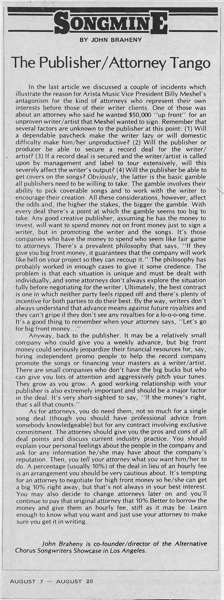A John Braheny Songmine column from the archives…

Accession Number: C000000137-034-001 Document/Digital File, “Songmine: The Publisher/Attorney Tango by John Braheny”, OCR converted text under same Accession Number
(Digitally converted text. Some errors may occur)
The Publisher/Attorney Tango
In the last article we discussed a couple of incidents which illustrate the reason for Arista Music Vice President Billy Meshel’s antagonism for the kind of attorneys who represent their own interests before those of their writer clients. One of those was about an attorney who said he wanted $50,000 “up front” for an unproven writer/artist that Meshel wanted to sign. Remember that several factors are unknown to the publisher at this point: (1) Will a dependable paycheck make the writer lazy or will domestic difficulty make him/her unproductive? (2) Will the publisher or producer be able to secure a record deal for the writer/ artist? (3) If a record deal is secured and the writer/artist is called upon by management and label to tour extensively, will this severely affect the writer’s output? (4) Will the publisher be able to get covers on the songs? Obviously, the latter is the basiC gamble all publishers need to be willing to take. The gamble involves their ability to pick coverable songs and to work with the writer to encourage their creation. All these considerations, however, affect the odds and, the higher -the stakes, the bigger the gamble. With every deal there’s a point at which the gamble seems too big to take. Any good creative publisher, assuming he has the money to invest, will want to spend money not on front money just to sign a writer, but in promoting the writer and the songs. It’s those companies who have the money to spend who seem like fair game to attorneys. There’s a prevalent philosophy that says, “If they give you big front money, it guarantees that the company will work like hell on your project so they can recoup it.” The philosophy has probably worked in enough cases to give it some credence. The problem is that each situation is unique and must be dealt with individually, and some attorneys don’t always explore the situation fully before negotiating for the writer. Ultimately, the best contract is one in which neither party feels ripped off and there’s plenty of incentive for both parties to do their best. By the way, writers don’t always understand that advance means against future royalties and they can’t gripe if they don’t see any royalties for a lo-o-o-ong time. It’s a good thing to remember when your attorney says, “Let’s go for big front money…”
Anyway, back to the publisher. It may be a relatively small company who could give you a weekly advance, but big front money could seriously jeopardize their financial resources for, say, hiring independent promo people to help the record company promote the songs or financing your masters as a writer/artist. There are small companies who don’t have the big bucks but who can give you lots of attention and aggressively pitch your tunes. They grow as you grow. A good working relationship with your publisher is also extremely important and should be a major factor in the deal. It’s very short-sighted to say, “If the money’s right, that’s all that counts.”
As for attorneys, you do need them, not so much for a single song deal (though you should have professional advice from somebody knowledgeable) but for any contract involving exclusive commitment. The attorney should give you the pros and cons of all deal points and discuss current industry practice. You should explain your personal feelings about the people in the company and ask for any information he/she may have about the company’s reputation. Then, you tell your attorney what you want him/her to do. A percentage (usually 10%) of the deal in lieu of an hourly fee is an arrangement you should be very cautious about. It’s tempting for an attorney to negotiate for high front money so he/she can get a big 10% right away, but that’s not always in your best interest. You may also decide to change attorneys later on and you’ll continue to pay that original attorney that 10% Better to borrow the money and give them an hourly fee, stiff as it may be. Learn enough to know what you want and just use your attorney to make sure you get it in writing.
John Braheny is co-founder/director of the Alternative Chorus Songwriters Showcase in Los Angeles.
See all previous entries in the Songmine Series
About Songmine and Music Connection Magazine:
John Braheny met Eric Bettelli and Michael Dolan right before they were going to publish Music Connection magazine. Eric and Michael wanted to get their publication out to as many songwriters as they could. They had already heard of the LA Songwriters Showcase, and of John and his partner, Len Chandler. John’s goal was to advertise the schedule of guest speakers and performers at the weekly Showcase… so they made a deal.
They published John’s Songmine column (he had never before written a magazine article!) in their very first edition, in November 1977. Trading out the column for advertising, this arrangement continued for many years. Plus, Eric and Michael came to the Showcase each week and distributed free copies to the songwriters!
Those articles became so popular that (book agent and editor) Ronny Schiff offered John’s articles to F&W Media, where they became the backbone of John’s textbook, The Craft and Business of Songwriting. As a follow-up, Dan Kimpel (author, songwriter, teacher), who had also worked at LASS, took on the Songwriting column at Music Connection magazine which continues to this day! You can subscribe to get either hard copies or online.
No comments yet.